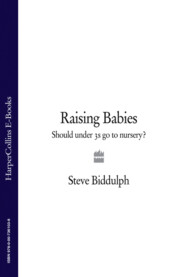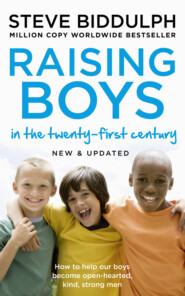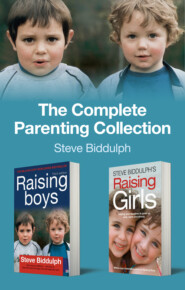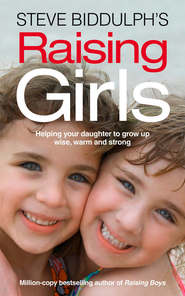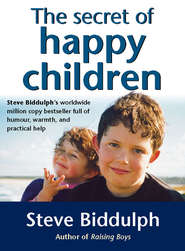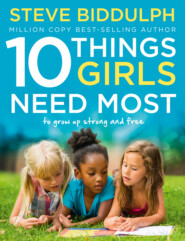По всем вопросам обращайтесь на: info@litportal.ru
(©) 2003-2024.
✖
The Secret of Happy Parents: How to Stay in Love as a Couple and True to Yourself
Автор
Год написания книги
2019
Настройки чтения
Размер шрифта
Высота строк
Поля
Let’s explore the subject of sexual bonding in more depth. Our sexuality is much more than a simple animal urge to procreate, it is connected to our emotions and our thoughts, and has a magnetic way of drawing people into relationships which can then develop far beyond simply lusty desire. In this way it builds between two people an accumulating reserve of pleasure, security, release and openness.
Lifelong pair-bonds are common in the animal world (and so is promiscuity, but few species combine the two). The unique nature of human sexuality – the intense female orgasm which only humans seem to experience and the absence of the distinct ‘on heat’ cycle experienced by other mammals – means that (for reasons we do not yet understand) sex is constantly present in our social lives. In evolutionary terms, pair-bonding meant that the whole fabric of family and clan was made more secure and trustworthy. People could spend time away hunting, children could be raised in relative safety, because the sexually forged bond between partner-parents meant that they would yearn for the specific company of that one person, above any other.
This carries a risk though. Put in simple terms, if you have sex with someone, you are very likely to fall in love with them. So clearly, it is not a good idea to get bonded to someone whom your heart and head have huge reservations about. This is why all human cultures are very careful about adolescent sexuality, and why young people themselves, in spite of what adults believe, are actually very conscious about relinquishing their virginity. Research has shown that a surprising 25 per cent of all young people are still virgins at twenty-one. Given the power of sexual attraction, young people have to be admired: most manage to hold out for a relationship with some closeness and mutual vulnerability. Those of us who don’t quite manage usually learn the lesson and quickly become more selective.
When ‘the fire down below’ connects with mental sparkle up top and the glow of emotion from the heart, then all three are charged and magnified. It’s worth waiting for.
Compatibility problems: why men and women sometimes miss
Julie Henderson, the bioenergetic therapist who taught us these levels of connection, says that men traditionally have ‘closed’ (shielded, unresponsive) hearts and ‘open’ (active, energised) genitals, while women traditionally have ‘closed’ genitals and ‘open’ hearts.
Men of the older, stiff-upper-lip generation, would often experience some alarm at the powerful and unsettling emotions that arise, whether it be through falling in love, being present at a birth of a child or saying goodbye to someone forever. In short, these men needed to gain the softening that comes from an open heart.
Older women usually experienced loving feelings as a matter of course, but were often stunned and delighted at the energetic glow and sense of satisfaction that accompanied their first really good sexual experiences. In short, these women needed to gain the power that comes from ‘owning’ your pelvis, considered in both ancient yoga and modern bioenergetics to be the energy source of assertiveness and will.
As men became more ‘feelingful’, and women more assured, healthy and strong contact between the genders became a possibility. Some great marriages emerged in the latter part of the twentieth century. In fact, you can be sure that some couples have always forged equal relationships through sheer strength of character – in biblical times, in Shakespeare’s time and in every epoch. The difference in the late twentieth century was that the culture began to support this as a general principle.
Things were looking great – except that the pendulum just kept on swinging!
The trouble with ‘New Women’ and ‘New Men’
The culture of the 1980s and 1990s has produced many tough-hearted women and many more soft-hearted men. This does create a new set of problems from those who gained experience in earlier times.
For years women complained about the pushiness of males, saying they were domineering, insensitive, and so on. Fair enough. But a different kind of complaint has arisen in recent years. Many of today’s men have been so filled with the need to be considerate and supportive that they back off from the really lustful pursuit and assertiveness that characterizes spirited sexuality.
We talk with many young women these days who are frustrated by the wimpishness of their men, in bed and out, even though this kind of softer man was what women for a time thought they wanted. Sensitive, yes, but uncertain and childlike, no!
You can be lustfully pleasure-seeking, and also considerate and aware. You can give pleasure fiercely, and take it fiercely. It’s a matter of communication, trust, and letting each other know what is wanted and not wanted, without offence. It takes time to develop this. Sometimes decades. When the conditions are right, most women, and most men, find unbridled passion extremely pleasing.
PRACTICAL STEP 3: CAN YOU HAVE SEX TOO SOON?
How soon in a relationship should one hop into bed with one’s new love? Ideas on this have swung wildly in the last forty years. People used to wait for years. Today sex on a first date is not uncommon among older single adults.
Mary Pipher in her excellent book Reviving Ophelia points out that girls as young as their mid-teens today feel they have to be sexually active; that the sexual revolution has just turned into another pressure. Boys also admit privately that they want more romance and closeness, that sex is a pressure they feel they have to live up to. This is not to say that girls or boys are not also strongly sexually motivated as well. Just that their sense of timing and romance is being violated by what they think is expected of them. It’s far from rare for a teenage boy and a girl to have sex because each thinks the other expects it of them.
It’s possible that having sex too soon actually prevents closeness, rather than promotes it. Our counselling experience is that many singles get trapped in this pattern, actually preventing any strong or good relationship from growing. One night stands are full of guardedness and morning-after embarrassment. As the veteran family therapist Carl Whitaker once said, it’s a penis and a vagina going out on a date together. When you are physically intimate but still mentally distant, you put on more armour. It’s a very schizophrenic situation. Like someone who tells their life story to everyone they meet, there is no feeling of specialness or vulnerability. Also, because tension has not had a chance to build, there is no big deal, and the sexual chemistry is only mediocre.
The best sexual bonding requires some tension and exploration, some chasing and holding back, and even some old fashioned courtship. Jumping into lust can fool your senses: you can be confused about whether true liking or loving are present. (What actor Robin Williams calls the difference between Miss Right and Miss Right Now!) Liking actually arises from good AND bad experiences: discovering how your partner reacts when the car breaks down, when you are sick, broke or hassled. These things test the liking and loving you have felt. A hundred hot nights of passion, delightful as they may be, aren’t actually going to test any of these things. Lust-based relationships in the real world wind down quite quickly when the other two elements are not around.
The more complete the combination of love, liking and lust, the greater the degree of emotional letting-go into truly transforming sexuality.
Casual sex
The free love ethic of the sixties was to have casual sex with anyone who appealed to you at the time and ‘as long as you’re honest’ everything would be cool. It may have been an important and necessary step when the old order was being overthrown in terms of rigid sex roles, militarism, conformity, and trusting government and business. The sexual revolution moved things along at a great pace.
Before long, however, the fallout started. Casual sex was okay in theory but for most of us it didn’t seem to work. Backyard abortions, broken hearts, drugs to block out the pain, and a deadly sense of disillusionment were often the results.
Bodies are not compartmentalized. Your heart, your mind, and your sexuality, are all parts of the whole you. It is not possible to have sex with someone you don’t like, don’t trust or don’t understand, without making enormous internal divisions, shutting down natural energies and emotions.
You can’t make love from the waist down, and keep your heart and your head out of the equation, without a lot of personal pain.
Luckily experience is a great teacher. A friend of ours separated from her husband after twelve years of marriage. She went through a rapid series of lovers – perhaps to reassure herself that she was lovable, or to capture the adolescence she felt she had missed. Then one day she told us of a new man. She proudly told us ‘I am not going to sleep with him just yet. I think this relationship is the one I really want, and I am going to do it properly’.
Junk sex
Junk food is quick, easy and looks better than it tastes. Just as quality cooking takes time and care, quality loving means getting to know your partner as a person. Junk sex, like junk food, leaves you malnourished. Junk sex is not limited to singles either – many long-standing couples have given up on nourishment and just settle for a diet of relationship pizza.
Putting It Altogether
The phrase ‘making love’ has come about because it describes so poetically an ideal we all seek. When you get sexuality right, making love is exactly what you are doing. It’s not the same as just fucking (though it includes the vigour and earthiness of this lovely Anglo Saxon term). Nor is it the rather fey-sounding ‘bonking’ of the postmodern gender neutral generation. Your heart opens (softens and beats more powerfully), your genitals open (moisten and enlarge), your mind opens (sharpens and sparkles), to let the other person in at every level. Achieving this is rarely rapid, and can never be a passing thing.
Once you have made LOVE, then just ‘having sex’ will never do. Teenagers ‘fall in’ love; adults ‘make’ love. It is a flame which a skilful human being learns to kindle. In a day-to-day relationship the flame flickers, dies down and flares up again, as we learn to tend it skilfully. Our efforts are rewarded. Love starts as a blessing, even a fluke, but it continues as an achievement.
PRACTICAL STEP 4: REMEMBER YOUR FRIENDS
In the excitement of becoming a couple, people make a serious mistake: they forget about their friends. The role of friends in making life happier and easier has been badly neglected in our culture – especially amongst men. Friendships are often seen as almost a casual thing, people to fill in time with until one finds one’s ‘true love’. The post-war nuclear family was supposed to be totally self-sufficient. Friends were for chatting to at barbecues, to sell Tupperware to, and have over for a game of bridge. Then we began to discover the dramatic fact that the couple or the family in isolation does not work. A family on its own is about as stable as a tent with no pegs. The steep rise in both marriage break-ups and single parenthood soon led people to realize that friends were like insurance – they would be there when marriage failed or was just in a stuck spot. Lack of friends may even cause a marriage break up: it places too much strain on couples and leaves too few support networks in the event of hardship, illness, the death of a child. Today this tide is changing. People are valuing friends more. Men, and women, meet in cafes to chat once a week. The rise of men’s groups, and the willingness of parents of young children to build strong and intimate friendships with their neighbours, has begun putting some ‘village’ back into our lives.
Friends help you to continue to grow as an individual – not just one half of a couple. Long-term friends remember the teenager you once were, what you’ve loved, lost, tried, and achieved. And they remind you of your authentic self. This strengthens you and prevents you from losing yourself, and so the marriage itself is made stronger.
Вы ознакомились с фрагментом книги.
Приобретайте полный текст книги у нашего партнера:
Приобретайте полный текст книги у нашего партнера:






